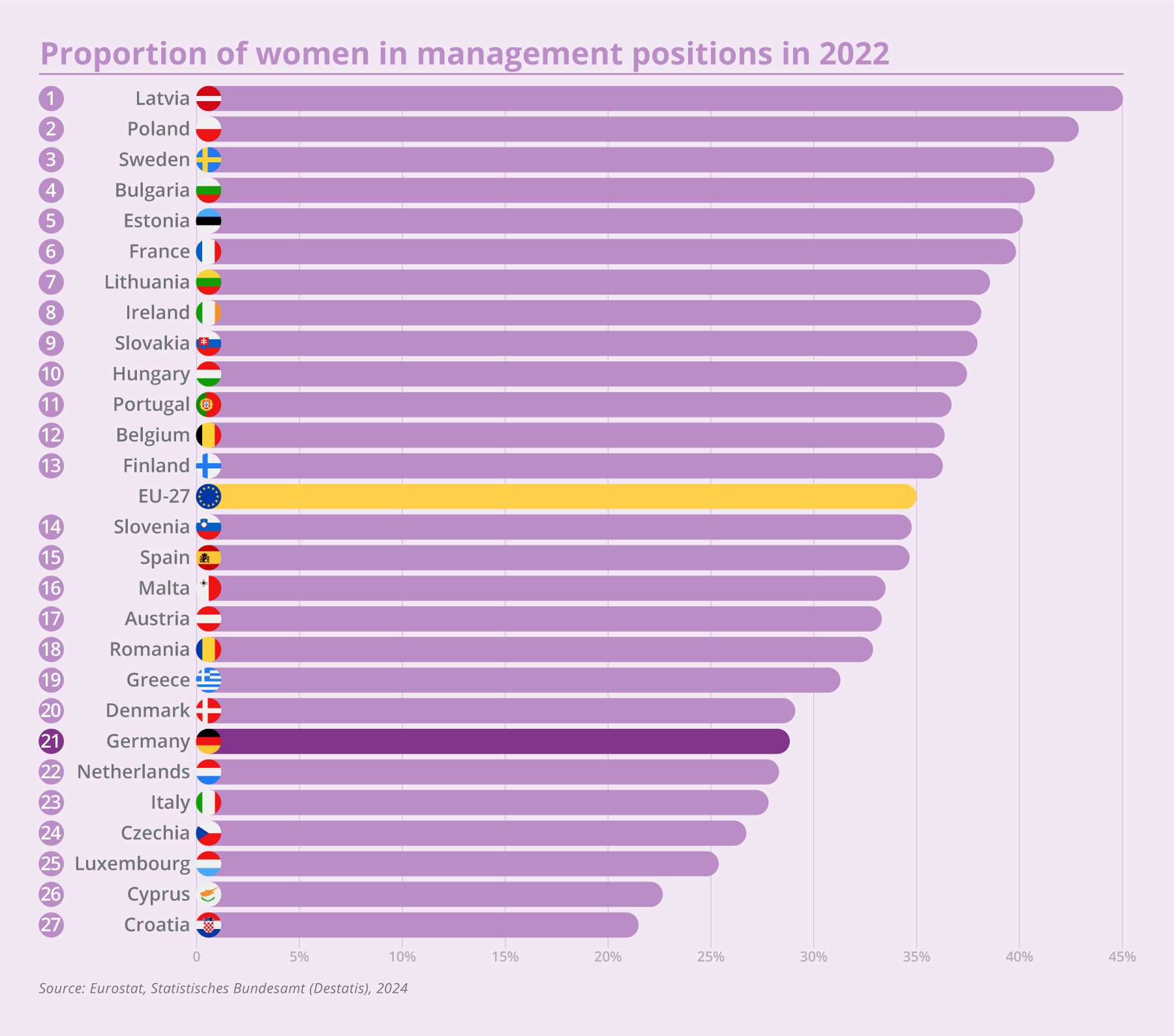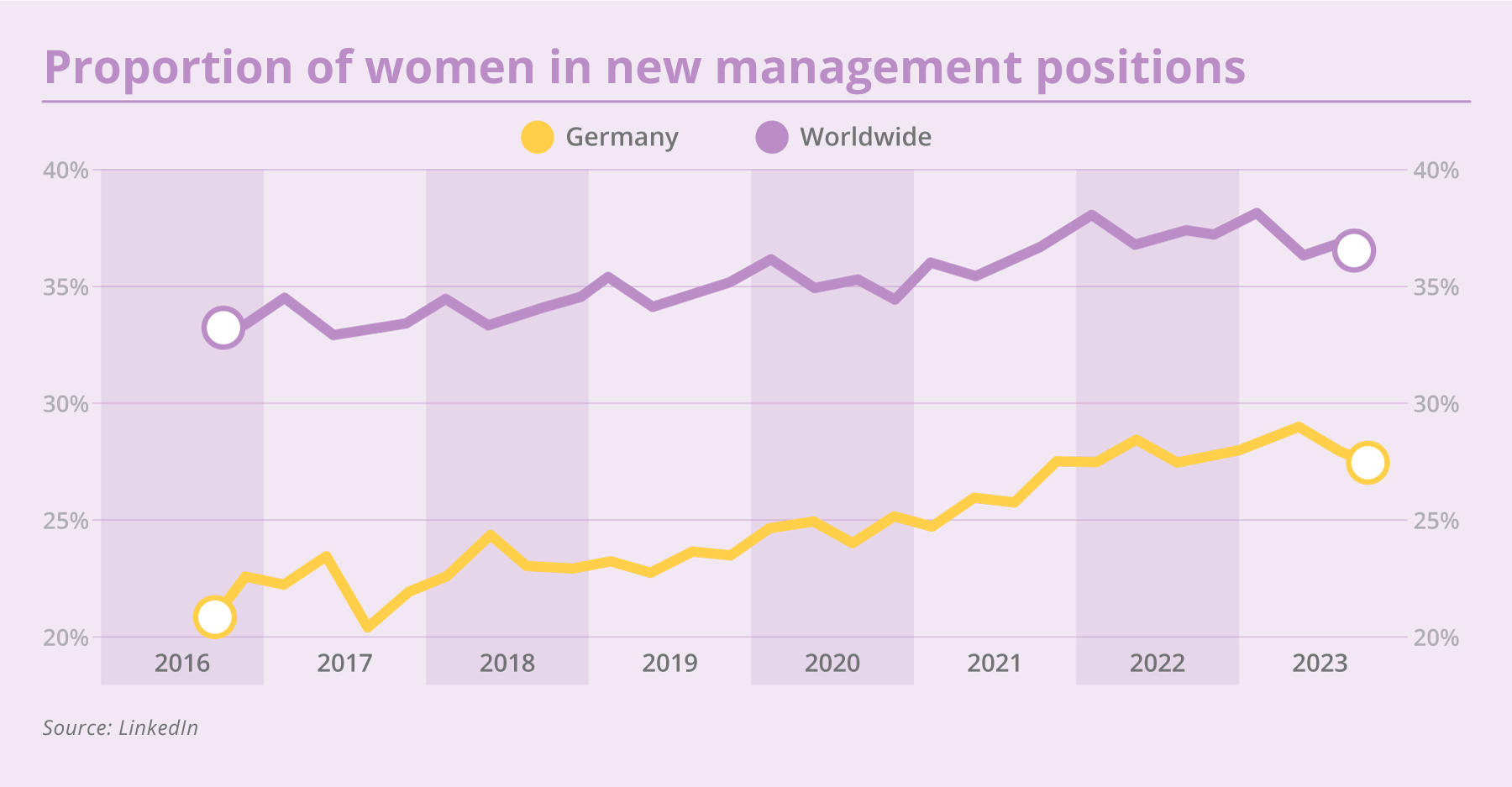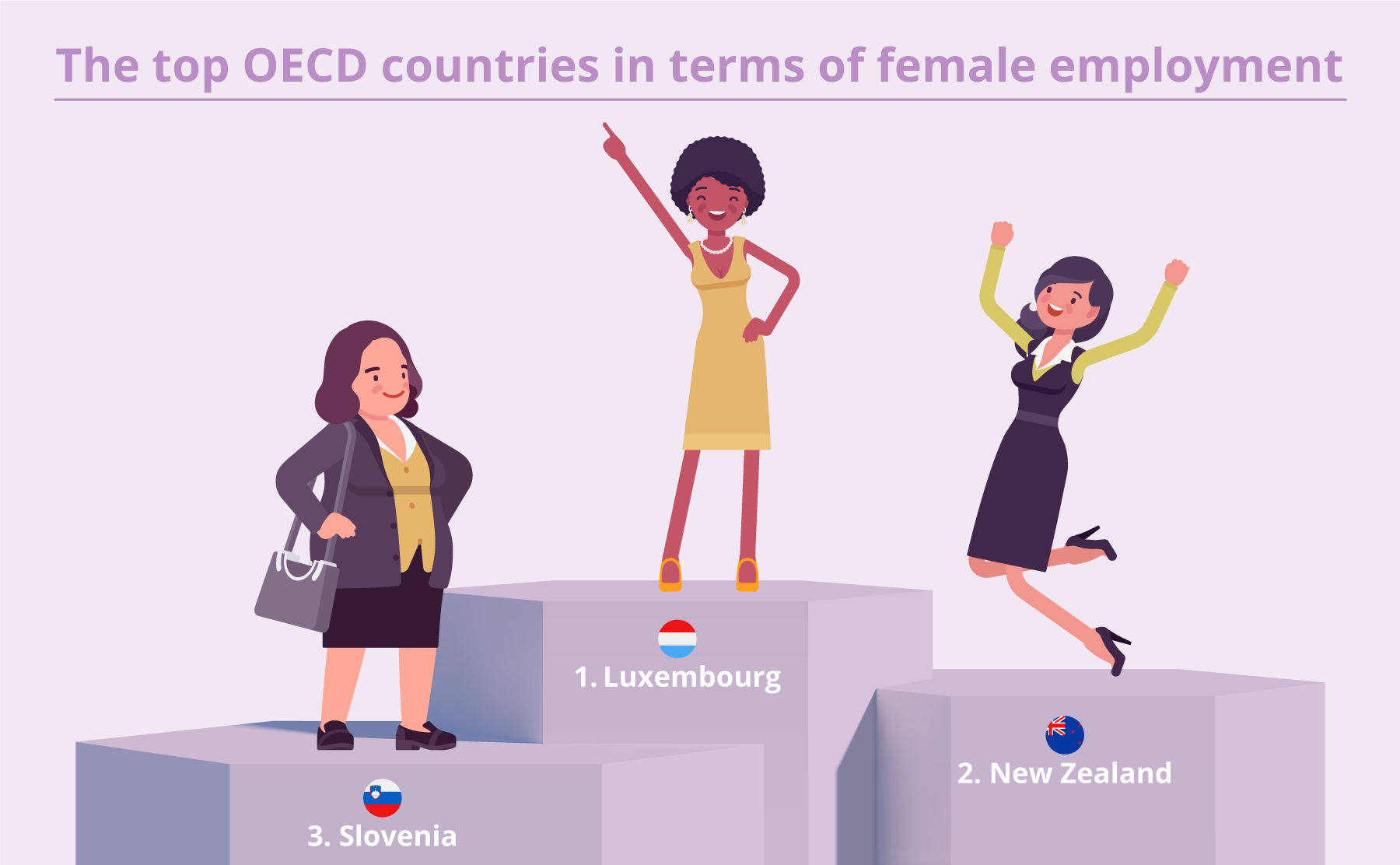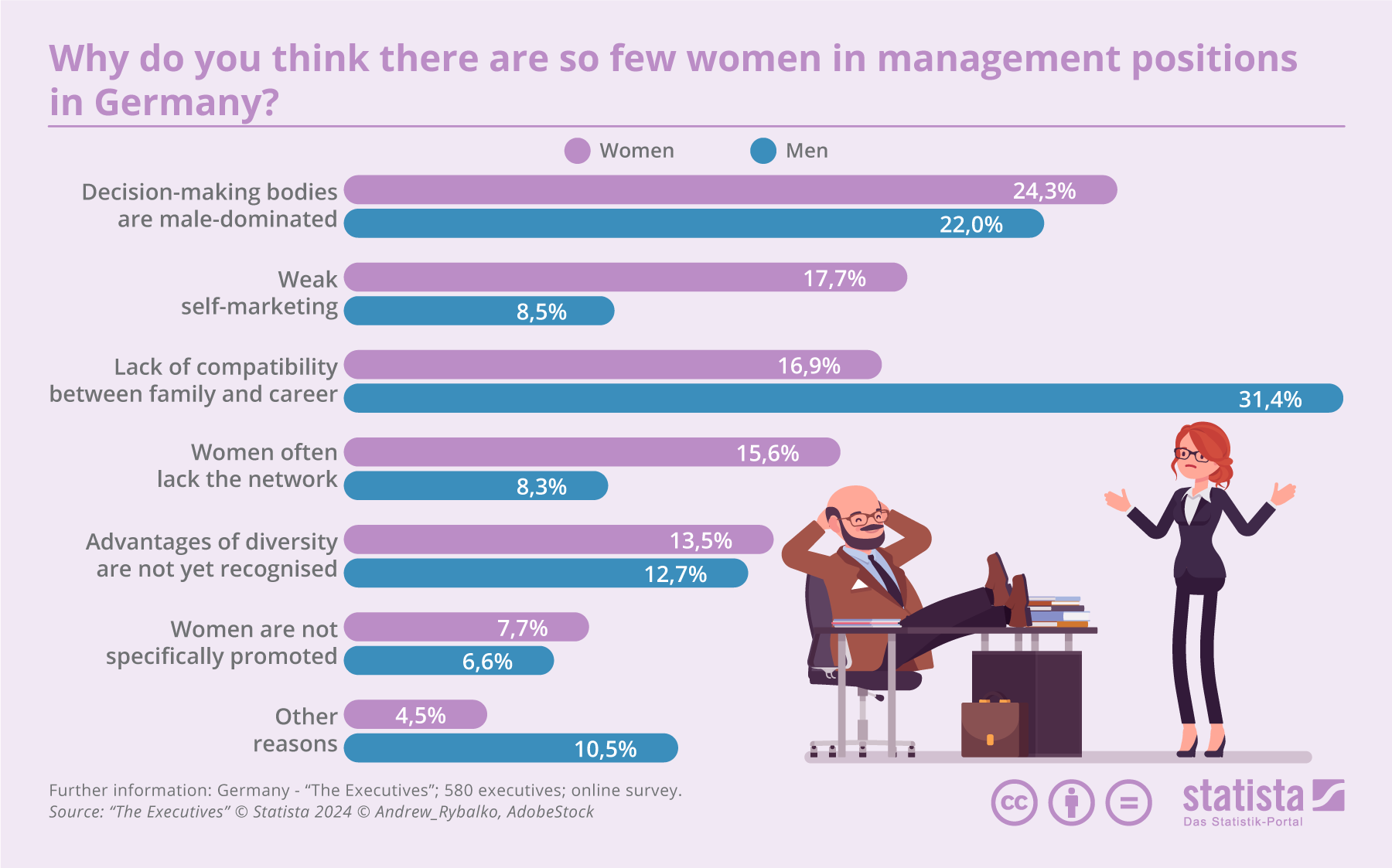Gender equality in Europe: Women only hold one in three management positions
Gender equality is a key issue in modern societies. One potential indicator of progress is the proportion of women in management positions. In 2022, however, women were still underrepresented in management positions in Europe.
With an EU-wide average of around 35 per cent, only one in three management positions is held by a woman. In Germany, the proportion was even lower than the average, at just under 29 per cent. Despite progress in many areas, progress when it comes to equality in management positions is still quite slow.
Women only hold one in three management positions
According to Eurostat, there were over 6.7 million people in management positions in the European Union of 27 Member States (EU) in 2019: 4.3 million men (63 per cent of all managers) and 2.5 million women (37 per cent). In addition, in the same year, women made up just over a quarter (28 per cent) of supervisory board members of EU-listed companies and less than a fifth (18 per cent) of executive directors.
Although women make up around half of the labour force in the European Union, they are still underrepresented in management positions.
According to the Federal Statistical Office, around 46 per cent of all employees in the EU were women in 2022. At just 35.1 per cent, only one in three managers was female that year. Women are therefore significantly underrepresented at management level. At 28.9 per cent, Germany is only in the bottom third of the 27 EU countries, in 21st place.
Latvia, on the other hand, is the EU leader in terms of the proportion of women in management positions with 45 per cent.
Poland (43 per cent), Sweden (42 per cent) and Bulgaria (41 per cent) achieved rates above the forty per cent mark. The lowest percentages of women in management positions were recorded in Croatia (22 per cent), Cyprus (23 per cent) and Luxembourg (26 per cent).

Women hit harder by the economic crisis
LinkedIn data for the WEF Global Gender Gap Report 2023 shows: New hires of women in leadership positions worldwide have fallen to 2021 levels The proportion of women in management positions worldwide has only increased by around one per cent per year over the last eight years. The outbreak of the coronavirus pandemic slowed this progress and women were more affected by the slump in the labour market than men. The Ukraine conflict has once again weakened the global labour market. LinkedIn data shows that this crisis threatens to reverse the progress of the last two years and that it is once again women who are clearly feeling the negative consequences.
"In times of economic uncertainty, the negative effects hit women harder than men - we have already seen this during the pandemic, during which women worldwide have fallen behind professionally. As a result of the ongoing crisis, women are now being pushed into the background again and the progress we have been able to make in recent years has been reversed," says Barbara Wittmann, Country Manager LinkedIn DACH. "To close this gap, we need a systemic solution and a combination of measures and tools. Inclusive hiring practices, greater visibility of women in top positions and training and career opportunities for women, especially in high-growth and high-income industries, are particularly important to correct this worrying trend."

Regardless of industry, a continuous upward decline in the proportion of women can be observed within the individual career levels. On a global average, their share at management level falls to 25 per cent, while almost half of entry-level positions are held by women. Some sectors are doing better than others: In the consumer goods industry, for example, more than half of entry-level positions (57 per cent) are held by women, compared to just 38 per cent of management positions. In the education and teaching sector, 60 per cent of entry-level positions are held by women, but the proportion of women in management positions is only 39 per cent.
Little progress on gender equality
The current values of the "Woman in Work Index" 2023 show that the index value has improved slightly for the first time due to an economic recovery on the labour markets after COVID-19. However, there is still no reason to be happy, as it does not show any real progress in the area of gender equality.
"An 18-year-old woman entering the labour market today will not experience equal pay in the course of her working life. As the gender pay gap continues to narrow, it will take more than 50 years to achieve gender pay equality. If the COVID-19 recovery has taught us anything, it's that we can't rely on economic growth alone to achieve gender equality - unless we want to wait another 50 years or more. We need to design and develop policy solutions that actively address the root causes of today's inequality," said Larice Stielow, Senior Economist at PwC UK.
The leaders in the Woman in Work Index 2023, i.e. the countries that generally perform best in terms of female employment, are Luxembourg, New Zealand and Slovenia. The biggest improvement in the rankings was achieved by Hungary, which rose nine places in the index from 22nd to 13th. Switzerland, on the other hand, recorded the biggest fall in the rankings, dropping six places from 14th to 20th.
Every year, the economic consultancy firm PwC publishes the "Woman in Work Index". This assesses the employment situation of women in 33 OECD countries in terms of the employment rate, the difference between the employment rate of women and men, the gender-specific unemployment rate, the proportion of women in full-time employment and the gender pay gap.
PwC's Global Empowerment Index, which looks at the gender perspectives of nearly 22,000 working women from around the world (across a range of employers, industries and institutions outside of PwC), also highlights that significant progress is still needed to achieve a degree of equality. At current rates, it will take more than half a century to close the gender pay gap in the OECD, according to the PwC analysis.
The current results of the PwC Women in Work Index 2023 and the Global Empowerment Index therefore show one thing: the workplace is still a place characterised by inequality for women.
Causes of gender inequality in management positions
Women are not less qualified or less suitable for management positions. Rather, women still find it difficult to excel in a male-dominated world. Structural and social barriers play a decisive role in this imbalance. Why women are underrepresented in management positions is a matter for debate. A survey of around 2,400 managers in the industry conducted by HR consultancy Odgers Berndtson shows that gender also plays a role in determining which position is taken. Men and women blame different things for this. While women tend to blame themselves for the unequal distribution of the sexes at management level, men see the causes primarily in the system and in a lack of childcare facilities.
System error
The lack of work-life balance is consistently one of the main reasons for the low proportion of women in management positions. The often inadequate childcare situation may also be one of the reasons why women are not to be found at higher company levels. Pregnancy, during which women on maternity leave and the period after the birth generally do not work, often means that they lose out when it comes to reconciling work and family life, as fathers usually remain in their jobs.
According to a survey of around 2,000 managers conducted by HR consultancy Odgers Berndtson, around two thirds of male managers consider the childcare situation to be inadequate and see this as a key reason for the lack of gender diversity at senior company levels. This leads to women having to choose between career and family. Around 50 per cent of men believe that women turn down top management positions if they are not compatible with their family situation. However, only 38 per cent of women agree with this.
This difference is also reflected in the gender-specific agreement with the following statement: "In the end, women decide in favour of their family rather than their career." 29 per cent of the women surveyed agree with this statement. The figure for men is 52 per cent.
In order to overcome this problem, better framework conditions are needed to reconcile work and family life, including for men.
With a negative gender pay gap of -0.2 per cent, Luxembourg is the leader in the OECD comparison. This means that the average wage level of women there is even higher than that of men. With a score of around 80 out of 100 points, Iceland and Slovenia lead the ranking alongside Luxembourg. A weighted average of five indicators is calculated for the index, including the female employment rate, the proportion of full-time employees, the unemployment rate and gender pay equality. Data from the year before last - in this case 2022 - is used annually for the calculation.

Male-dominated decision-making bodies
Decision-making bodies are often male-dominated, which means that women have fewer opportunities to take up management positions. The AllBright Foundation has published an article that highlights this problem once again. According to the article, 86 per cent of board members in German listed companies are male. Society, markets and working methods are changing, but almost all companies have continued to rely on the same management teams made up of men of the same age, origin and education for decades.
With "Facts versus empty phrases" on the topic of women's quotas in companies, AllBright makes it clear that it is not a question of qualifications that the proportion of women in management positions is so low. If this were the case, the male dominance would not be so high.
Oft werden Frauen unbewusst schlechter beurteilt, seltener für Führungspositionen vorgeschlagen und seltener aufgrund ihres Potenzials eingestellt und befördert. Wer sich etwas mehr mit den Auseinandersetzungen der Stiftung speziell zu diesem Problem belesen möchte, für die oder den ist das FührungsFrauenBingo genau das Richtige.
Women are often unconsciously judged less favourably, are less likely to be put forward for management positions and are less likely to be hired and promoted on the basis of their potential. The FührungsFrauenBingo is just the thing for anyone who would like to read more about the Foundation's work on this problem in particular
Self-doubt
Women tend to emphasise their skills and achievements less than men, which can limit their chances of promotion.
In the Odgers Berndtson survey, 87 per cent of women see the self-doubt of female talent about their abilities as one of the main reasons for the unequal representation of women in management positions. In contrast, only 57 per cent of men are of the opinion that this self-doubt leads to fewer women being represented in management positions. There is an even greater difference when it comes to the presentation of one's own successes. 38 per cent of men are of the opinion that their female colleagues could do more here - among women, the figure is 80 per cent, who consider the presentation of their own successes to be too low. Women also see a need to learn when it comes to negotiating skills. 60 per cent of female managers are of the opinion that they do not negotiate hard enough - only four per cent of men agree with this.
According to the survey, women feel restricted when it comes to their leadership style. For example, 50 per cent of women say that they find it difficult to gain acceptance from men with their leadership style. Only 20 per cent of male managers share this impression. Women underestimate their potential and men do not take the female leadership style seriously, conclude the analysts at Odgers Berndtson. "It always fails because of supposedly solvable problems," says Silvia Eggenweiler, Partner Life Sciences at Odgers Berndtson. "Women drop out because they don't trust themselves to do the job, they question themselves too much, or because the environment is too male-dominated."
However, according to the further education magazine managerSeminare, studies show that women are just as good, if not better, managers than men. Nevertheless, only a few make it to the top echelons of management, as they have to prove themselves in a competition whose rules have been drawn up and customised by their male colleagues. Targeted coaching programmes for women help them to assert themselves with confidence.
Less desire for power and network
In the opinion of many male managers, women lack the desire for power. Around a third of the men surveyed in the Odgers Berndtson survey cited this as a reason for the unequal distribution of the sexes in management positions, compared to only 26 per cent of women. At the same time, less than half of the male respondents (43 per cent) are of the opinion that women in Germany are still too stuck in traditional role models. The female respondents (72 per cent) feel much more constrained by corresponding social expectations.
Whether it's about gaining the right work experience during training, being successful at work or making the next career leap - networks are crucial at every stage of a career. In a guest article in the business magazine 'Capital' by Mirijam Trunk, she points out differences in the networking behaviour of women and men. For example, while men are much more likely to recommend other men for positions, women are more reticent - for fear that it could reflect negatively on them if the recommendation is not well received.
What's more, networks reproduce themselves: We like to be with like-minded people and promote people in whom we recognise ourselves. This phenomenon results in what the AllBright Foundation calls the "Thomas Circle" effect, which leads to board members promoting younger versions of themselves in their succession planning.
The effect of cooperation and conflict also comes into play here: while men also network with men they don't like one hundred per cent, women are more selective. While "boys' clubs" can be found in many companies - groups of men who inform and support each other - "girls' clubs" are rarer or do not exist at all.
Women need to support each other more and not allow themselves to be lured into a competitive trap. There are many female coaches who promote precisely this: Networking women and making them more aware of their potential.
Other possible causes
Women are often not specifically promoted for management positions. To counteract this, companies should start promoting women at an early stage and ensure a balanced gender ratio in management development programmes.
And unfortunately, companies have not sufficiently recognised the benefits of diversity within the company.
A chart from statista from 2012 shows the reasons for the lack of female managers in Germany. Many of the aspects listed are still an existing social problem today.

Milestone for equality in Europe
Ein wichtiger Meilenstein, wenn es darum geht, mehr Frauen in Führungspositionen zu bringen, war die 2022 in Kraft getretene EU-Richtlinie. Die von der EU am 22. November verabschiedete Richtlinie für Führungspositionen enthält klare Vorgaben für den Frauenanteil in privaten Unternehmen: Bis Ende 2026 müssen 40 Prozent der Mitglieder in Aufsichtsräten beziehungsweise 33 Prozent der Mitglieder in Vorständen und Geschäftsführungen börsennotierter Unternehmen in der EU weiblich sein.
An important milestone when it comes to getting more women into management positions was the EU directive that came into force in 2022. The directive for management positions adopted by the EU on 22 November contains clear requirements for the proportion of women in private companies: By the end of 2026, 40 per cent of members of supervisory boards and 33 per cent of members of executive boards and management boards of listed companies in the EU must be female.
Lisa Paus, Federal Minister for Women's Issues, commented: "The EU Leadership Directive [...] is a milestone for gender equality in Europe. We are now getting standardised regulations in all European member states so that more women can make it into the top echelons of companies. Experience in Germany shows this: Fixed statutory quotas work. This directive is a major step towards equal opportunities as a common European value."
 © Lerbank-bbk22, AdobeStock
© Lerbank-bbk22, AdobeStock
Once the EU directive on management positions comes into force, EU member states have two years to take the necessary national measures. The directive only provides for exceptions for countries that have already implemented extensive measures and introduced a quota for women. In Germany, the second law for management positions (FüPoG II) already contains extensive measures that have led to a rethink in companies. Now there is also movement at European level.
Even if laws pave the way for more women in management positions, there needs to be a general rethink in society. Women must become aware of their abilities and use them confidently. Cohesion and a good network among women can only be beneficial. Strengthening each other and realising "I can do it!" is definitely worthwhile.

